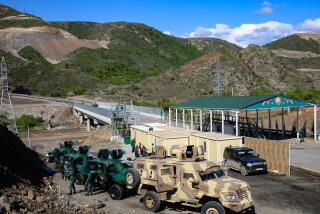Bleak Outlook
- Share via
The Geneva arms-control talks are a standoff. Unless the United States or the Soviet Union makes a move toward a compromise, and the other responds in kind, the outlook for heading off an accelerated nuclear-arms race is bleak.
The latest round of the Geneva talks recessed this week with each side harshly blaming the other for lack of substantive progress. U.S. delegation leader Max M. Kampelman and chief Soviet negotiator Viktor P. Karpov actually refused to shake hands for photographers when they parted.
It is too early to throw up our hands in despair. The two sides have come a long way since the initial negotiations on strategic arms and European-based missiles collapsed in late 1983. Both have proposed a 50% reduction in strategic weapons, and are within talking distance of a mutual reduction of medium-range missiles in Europe.
Furthermore, President Reagan and Soviet leader Mikhail S. Gorbachev both are under economic pressures to avoid a new spiral in arms spending. And both made a political commitment at their November summit meeting to keep talking. This in itself is a marked improvement over the situation two years ago, when U.S. and Soviet leaders were communicating basically by swapping insults.
Unfortunately, it has proved difficult to move from summit rhetoric to genuine progress.
Only a few weeks ago both superpowers were seemingly under the impression that a negotiated limitation on Euromissiles was within early reach as a result of Gorbachev’s decision not to make a ban on Reagan’s “Star Wars” program a prerequisite. But the Soviets were surprised to learn that the biggest obstacle lay not in Washington but in Tokyo and Peking--which want Soviet SS-20s removed from Asia as well as Europe--and in European capitals, where political leaders would rather leave U.S.-made missiles in place.
The real sticking point, however, is strategic defense. Until Washington and Moscow stop making unreasonable demands on each other, no progress is possible on the limitation of long-range offensive nuclear weapons.
The best solution would be an agreement that allowed both sides to continue research into anti-missile defense systems--a ban on research can’t be forced, anyway--and amended the 1972 anti-ballistic missile treaty to draw a line between research and the kind of development that would let one side surge ahead in what arms-control people call a “breakout.”
But the Reagan Administration so far refuses to put the President’s Strategic Defense Initiative, or Star Wars, on the bargaining table at all. Even American analysts believe that this looks to Moscow suspiciously like an American attempt to tilt the present situation of nuclear parity toward the United States.
The Soviet position is just as rigid. Despite some informal statements by Gorbachev, the Soviet negotiating position is still that the whole SDI program, including research, must be abandoned. The barriers to monitoring research in the closed Soviet society makes that position unacceptable.
Arnold L. Horelick, director of the Rand-UCLA Center for the Study of Soviet International Behavior, believes that the Soviets fear that the Reagan Administration will pocket any concession that they make and give nothing in return. The U.S. government is entitled to feel the same way.
In those circumstances, neither side is likely to volunteer the first move--a bleak prospect for arms control. The best hope is that their handswill be forced by pressures of circumstance. For Reagan, those pressures include budgetary realities and congressional pressures. Gorbachev does not have to contend with uppity congressmen, but the crying need to revive the Soviet economy means that he cannot relish all-out competition with the United States in offensive or defensive arms.
It is time for less self-serving rhetoric and more quiet diplomacy, perhaps at the foreign-minister/secretary-of-state level. But even that won’t work unless both sides genuinely want an agreement and are willing to back off from extreme positions in order to get it. So far, that essential ingredient is lacking in both Washington and Moscow.
More to Read
Sign up for Essential California
The most important California stories and recommendations in your inbox every morning.
You may occasionally receive promotional content from the Los Angeles Times.













